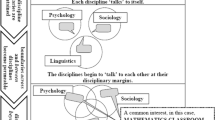Abstract
This article is an early step in the development of a methodological approach to the study of language deriving from an enactivist theoretical stance. Language is seen as a co-ordination of co-ordinations of action. Meaning and intention cannot easily be interpreted from the actions and words of others; instead, careful attention can be placed in not going beyond what is observable within the text itself, for example by focusing on patterns in word use. Conversations are highly ritualised affairs and from an enactivist perspective these rituals can be read in terms of pattern. The notion of the ‘structural coupling’ of systems, which will inevitably have taken place in a classroom, means that the history and context of communication needs to be taken into account. The methodological perspective put forward in this article is exemplified with an analysis of two classroom incidents (involving different teachers) in which almost identical words are used by the teachers, but markedly different things happen next. The analysis reveals a complexity within the classroom that, although available to direct observation, only became apparent using an approach to studying language that took account of the context and history of communication in a recursive process of data collection and analysis.


Similar content being viewed by others
References
Barwell, R. (2008). Discourse, mathematics and mathematics education. In M. Martin-Jones, A.-M. de Mejia & N. Hornberger (Eds.), Encyclopedia of language and education, vol. 3: Discourse and education (2nd ed., pp. 317–328). New York: Springer.
Bateson, G. (2000). Steps to an ecology of mind. Chicago: University of Chicago Press.
Bateson, G. (2002). Mind and nature: a necessary unity. Cresskill: Hampton Press Inc.
Blumer, H. (1954). What’s wrong with social theory. American Sociological Review, 19(1), 3–10.
Brown, L., & Coles, A. (2008). Hearing Silence: Steps to teaching mathematics. Cambridge: Black Apollo Press.
Brown, L., & Coles, A. (2011). Developing expertise: how enactivism reframes mathematics teacher development. ZDM—The International Journal on Mathematics Education, 43(6–7), 861–873.
Coles, A. (2009). Towards an aesthetics of education. In S. Lerman & B. Davis (Eds.), Mathematical action & structures of noticing: studies on John Mason’s contribution to mathematics education (pp. 135–146). Rotterdam: Sense Publishers.
Coles, A. (2013a). Being alongside: for the teaching and learning of mathematics. Rotterdam: Sense Publishers.
Coles, A. (2013b). On metacognition. For the Learning of Mathematics, 33(1), 21–26.
de Freitas, L. (2010). Regulating mathematics classroom discourse: text, context, and intersubjectivity. In M. Walshaw (Ed.), Unpacking pedagogy: new perspectives for mathematics classrooms (pp. 129–151). Charlotte: Information Age Publishing.
Edwards, D. (1997). Discourse and cognition. London: Sage Publications Ltd.
Goffman, E. (1975). Frame analysis. Middlesex: Penguin books.
Halliday, M. (1999). The notion of “context” in language education. In M. Ghadessy (Ed.), Text and context in functional linguistics (pp. 1–29). Amsterdam: John Benjamin Publishing Co.
Herbel-Eisenmann, B., & Wagner, D. (2010). Appraising lexical bundles in mathematics classroom discourse: obligation and choice. Educational Studies in Mathematics, 75(1), 43–63.
Herbel-Eisenmann, B., Wagner, D., & Cortes, V. (2010). Lexical bundle analysis in mathematics classroom discourse: The significance of stance. Educational Studies in Mathematics, 75(1), 23–42.
Juarrero, A. (2002). Dynamics in action: intentional behaviour as a complex system. Cambridge: The MIT Press.
Khan, S., Francis-Poscente, K., & Davis, B. (2015). Accumulation of experience in a vast number of cases: Enactivism as a fit framework for the study of spatial reasoning in mathematics education. ZDM—The International Journal on Mathematics Education, 47(2) (this issue).
Lefstein, A. (2008). Changing classroom practice through the English National Literacy Strategy: a micro-interactional perspective. American Educational Research Journal, 45(3), 701–737.
Maheux, J. & Proulx, J. (2015). Doing|mathematics: Analysing data with/in an enactivist-inspired approach. ZDM—The International Journal on Mathematics Education, 47(2) (this issue).
Maturana, H. (1988). Reality: the search for objectivity or the quest for a compelling argument. The Irish Journal of Psychology, 9(1), 25–82.
Maturana, H., & Varela, F. (1987). The tree of knowledge: the biological roots of human understanding. Shambala: Boston & London.
Maturana, H., & Verden-Zoller, G. (2008). The origin of humanness in the biology of love. Exeter: Imprint Academic.
Merleau-Ponty, M. (2002). Phenomenology of perception. London: Routledge.
Metz, M. & Simmt, E. (2015). Researching mathematical experience from the perspective of an empathic second-person observer. ZDM—The International Journal on Mathematics Education, 47(2) (this issue).
Ochs, E. (1979). Transcription as theory. In E. Ochs & B. Schiffelin (Eds.), Developmental pragmatics (pp. 43–72). New York: Academic.
Rampton, B. (2006). Language in late modernity: interaction in an urban school. Cambridge: CUP.
Rampton, B. (2007a). Neo-Hymesian linguistic ethnography in the United Kingdom. Journal of Sociolinguistics, 11(5), 584–607.
Rampton, B. (2007b). Illustrations of linguistic ethnography in action: a job interview. Resource document. Ethnography, Language & Communication. http://eprints.ncrm.ac.uk/1481/1/LE%20illustrative%20analyses%20takehome%2012mar073.pdf. Accessed 15 March 2008.
Reid, D. (1996). Enactivism as a methodology. In L. Puig & A. Gutierrez (Eds.), Proceedings of the twentieth annual conference of the International Group for the Psychology of Mathematics Education (vol. 4, pp. 203–209). Valencia: PME 20.
Reid, D., & Mgombelo, J. (2015). Roots and key concepts in enactivist theory and methodology. ZDM—The International Journal on Mathematics Education, 15(2) (this issue).
Sacks, H. (1995). Harvey sacks lectures on conversation. Volumes I & II. Oxford: Blackwell.
Schegloff, E. (1989). Harvey sacks—lectures 1964–1965: an introduction/memoir. Human Studies, 12, 185–209.
Steinbring, H. (2015). Mathematical interaction shaped by communication, epistemological constraints and enactivism. ZDM—The International Journal on Mathematics Education, 15(2) (this issue).
Stroh Becvar, D., & Becvar, R. (2000). Family therapy: a systemic integration. Boston: Allyn & Bacon.
Thompson, E., & Stapleton, M. (2009). Making sense of sense-making: reflections on enactive and extended mind theories. Topoi, 28(1), 23–30.
Varela, F. (1999). Ethical know-how: action, wisdom and cognition. Stanford: Stanford University Press.
von Bertalanffy, L. (1969). General system theory. New York: George Braziller.
Wittgenstein, L. (2009). Philosophical investigations (4th ed.). Oxford: Wiley-Blackwell.
Author information
Authors and Affiliations
Corresponding author
Rights and permissions
About this article
Cite this article
Coles, A. On enactivism and language: towards a methodology for studying talk in mathematics classrooms. ZDM Mathematics Education 47, 235–246 (2015). https://doi.org/10.1007/s11858-014-0630-y
Accepted:
Published:
Issue Date:
DOI: https://doi.org/10.1007/s11858-014-0630-y



